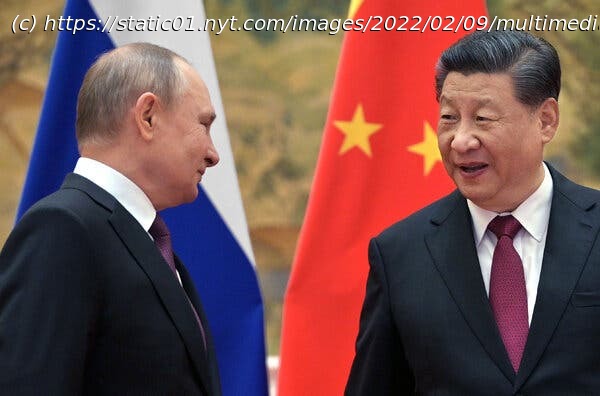China and Russia have formed an “alliance of autocracies.”
The last time Xi Jinping left China was more than two years ago, for a diplomatic trip to Myanmar. Days later, he ordered the lockdown of Wuhan, which began China’s aggressive “zero Covid” policy. By staying home, Xi has reduced his chances of contracting the virus and has sent a message that he is playing by at least some of the same pandemic rules as other Chinese citizens. Until last week, Xi had also not met with a single other world leader since 2020. He had conducted his diplomacy by phone and videoconference. When he finally broke that streak and met in Beijing on Friday with another head of state, who was it? Vladimir Putin. Their meeting led to a joint statement, running more than 5,000 words, that announced a new closeness between China and Russia. It proclaimed a “redistribution of power in the world” and mentioned the U.S. six times, all critically. The Washington Post called the meeting “a bid to make the world safe for dictatorship.” Kevin Rudd, a former prime minister of Australia, told The Wall Street Journal, “The world should get ready for a further significant deepening of the China-Russia security and economic relationship.” Today’s newsletter offers a guide to that relationship, with help from Times correspondents around the world. The current phase of the relationship has its roots in Russia’s 2014 annexation of the Crimean peninsula from Ukraine. The European Union and the U.S. responded with economic sanctions on Russia that forced it to trade more with Asia, Anton Troianovski, The Times’s Moscow bureau chief, notes. China stepped in, buying Russian oil, investing in Russian companies and more. “The conventional wisdom used to be that Putin didn’t want to get too close to China,” Anton said. That’s no longer the case. Russia returned the favor in recent years, buying equipment from Huawei, a Chinese tech giant, after the Trump administration tried to isolate the company. In the grandest sense, China and Russia are creating a kind of “alliance of autocracies,” as Steven Lee Myers, The Times’s Beijing bureau chief, puts it. They don’t use that phrase and even claim to be democracies. “Democracy is a universal human value, rather than a privilege of a limited number of states,” their joint statement read. “It is only up to the people of the country to decide whether their state is a democratic one.” But the message that China and Russia have sent to other countries is clear — and undemocratic. They will not pressure other governments to respect human rights or hold elections. In Xi’s and Putin’s model, an autocratic government can provide enough economic security and nationalistic pride to minimize public opposition — and crush any that arises.






